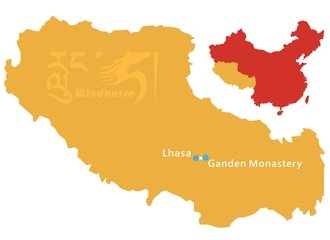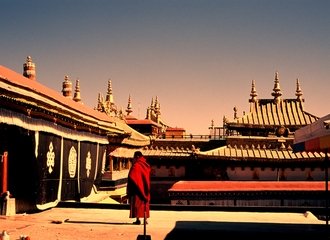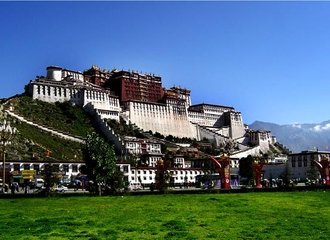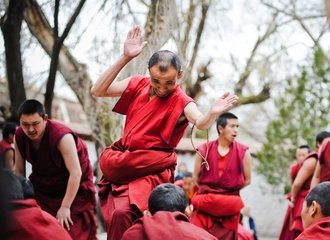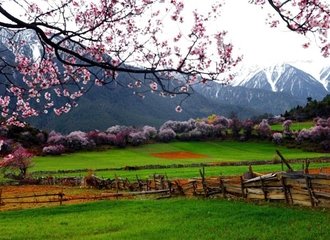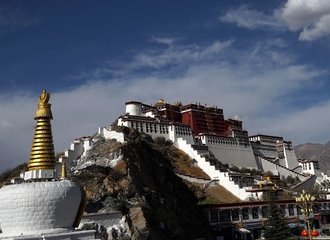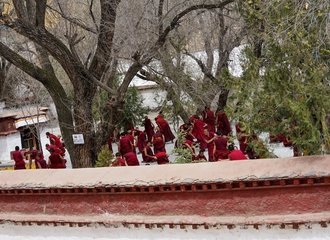Chinese Ethnic Minority- Yi People
The Yi people are among the 56 ethnic groups officially recognized by China. The Yi people are also known as the Nuosuo or Nuosu. They are the 7th largest ethnic group (out of 55 in total ethnic groups) with 9 million people and they mainly live in the Sichuan, Yunnan, Guizhou, and Guangxi mountain regions.
The Yi have their language, which is part of the Tibeto-Burman family, and they use a unique script that has been around since the 13th century and is still in use today.
Historically, Yi society was divided into groups similar to a caste system, with nobles, commoners, and slaves, but these distinctions are not as prominent today. The Yi are known for their vibrant and colorful traditional clothing and embroidery skills. They also have rich traditions in music and dance, and they celebrate many festivals. One of the most famous is the Torch Festival, which involves lighting torches to ward off evil spirits and pray for good harvests. The Yi culture offers a vivid example of the cultural diversity found in China.
Now, we are going to learn more about the Yi People, their history, customs, and traditions.
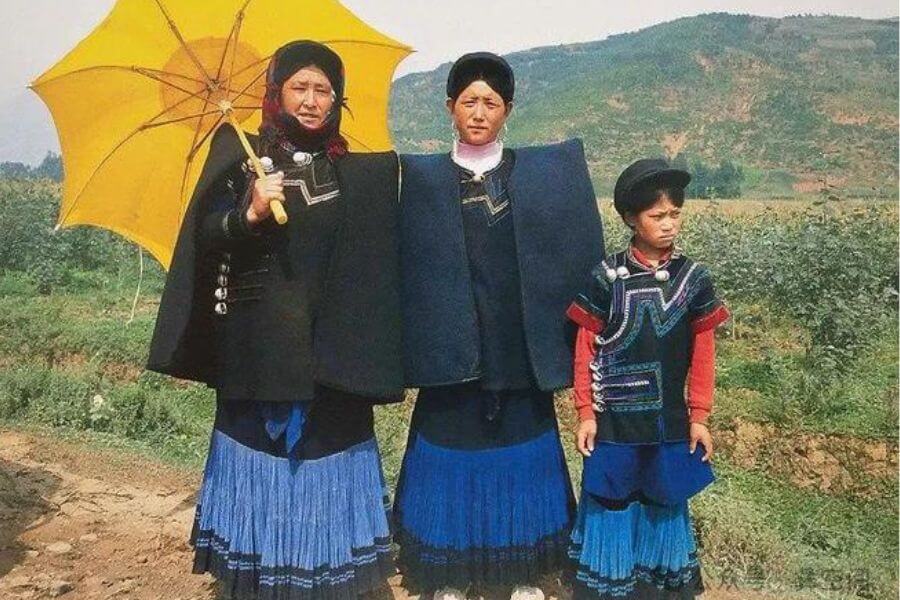
History of Yi People
The Yi people have historical documents mentioning them as far back as during the Qin and Han dynasties. So, we can say they have a very long history thousands of years. It is mentioned in the documents that at that time Yi people lived in the mountains of southwest China.
Despite many changes over time, the Yi have kept their unique cultural identity in a region where many different ethnic groups live.
Traditional Social Structure
Originally, the Yi society was set up like a caste system, which is unusual for China. The Black Yi (Nuohuo) were the nobles who owned the land and held most of the wealth. Below them were the White Yi (Qunuo), who were common people and had to serve the Black Yi. The lowest group was the slaves, who had no rights and often lived in tough conditions.
Changes Over Time
The Government of the People’s Republic of China made huge changes to get rid of slavery after 1949 (when the People’s Republic of China was established). Nowadays, the old social classes are mostly gone, especially in areas where the Yi mix more with other groups. The government has also helped the Yi with education and economic opportunities, which helps them blend more into China's larger society.
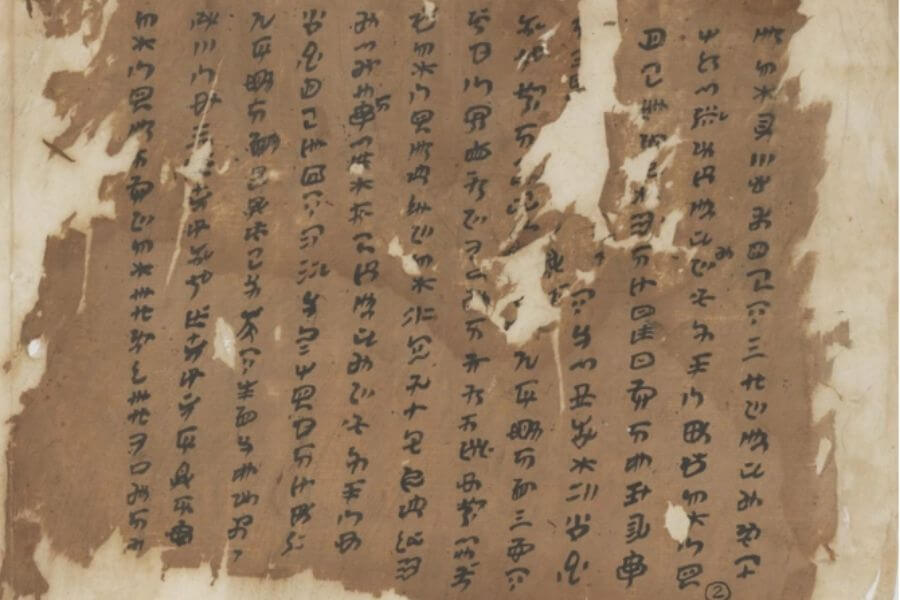
The Language of Yi People
The Yi language is a key part of the Yi people's rich culture and it belongs to the Tibeto-Burman language family. This connection shows their linguistic relationship with other ethnic groups in the Himalayan area, though the Yi language has its special features.
The Yi Script
One of the most interesting parts of Yi culture is their script, which was created around the 13th century. The Yi script is one of the few original scripts in China that people still use today. In the past, it was mostly used by the noble class for special occasions and keeping records. Over time, it has changed but remains important for keeping the Yi people's history and cultural traditions alive.
For travelers exploring different cultures, learning about the Yi language and script offers a deep dive into the historical and cultural richness of China’s minority groups. Seeing this language on signs or in books during your visit can make your trip even more engaging and meaningful.
Yi Cuisine
The base of the Yi cuisine includes corn, potatoes, and buckwheat, which are staple crops in the mountainous terrains they inhabit. These staples are often made into porridges or pancakes, serving as the base for many meals. Highland barley is also a common ingredient, especially in cooler areas, used in various traditional dishes.
Meat is a significant part of Yi cuisine, with pork and chicken being the most common. Yi people traditionally raise their own livestock, which results in fresh, organic meat that is often smoked or cured for preservation.
A hallmark of Yi cooking is the spicy chicken stew, which is made with local herbs and spices, including Sichuan peppercorns, giving it a distinctive hot and numbing sensation. Another specialty is Yi-style pork belly, slow-cooked with soy sauce, ginger, and garlic, which caramelizes the meat and infuses it with rich flavors.
Culinary Techniques
One of the most used techniques in culinary in Yi People is fermentation, they use various ingredients like cabbage and radishes to make Yi sour soup.
This soup, often served with meals, is known for its refreshing and digestive properties. Smoking and drying are also common, especially for meats and mushrooms, enhancing their flavors and extending their usability.
For travelers and food enthusiasts, Yi cuisine offers an authentic taste of the region's culture and natural bounty. Each dish tells a story of survival, tradition, and the deep connection the Yi people have with their land.
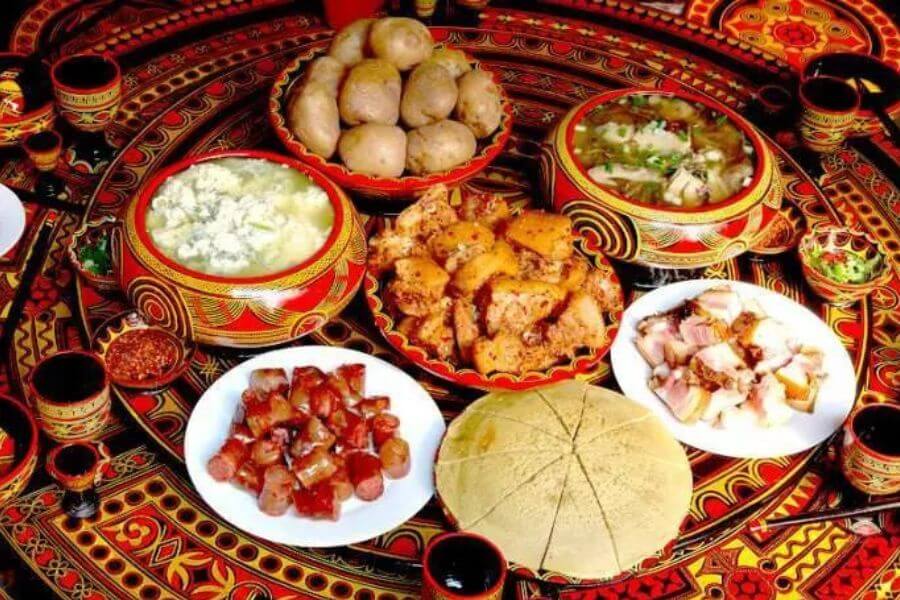
Customs and Cultural Traditions
The Yi people with their rich history have a very rich customs and traditions. We will mention the main customs and traditions.
Religious Beliefs of the Yi People
Religion is very important to the Yi people, blending elements of animism, shamanism, and ancestor worship. They believe in numerous gods and spirits that represent the natural world and their ancestors. Shamans, known as "Bimo," play a crucial role in Yi communities. They are deeply respected for their abilities to connect with the spirit world, lead rituals, and help solve community issues.
Funeral Rites
Yi funeral practices are detailed and can vary widely between different groups. The most common approach involves several stages of mourning, offerings, and rituals that show respect for the deceased and help their soul move on to the realm of ancestors. In some areas, the Yi practice sky burials or cliff burials, where the deceased are placed in caves or in high places, showing their belief in returning the body to nature.
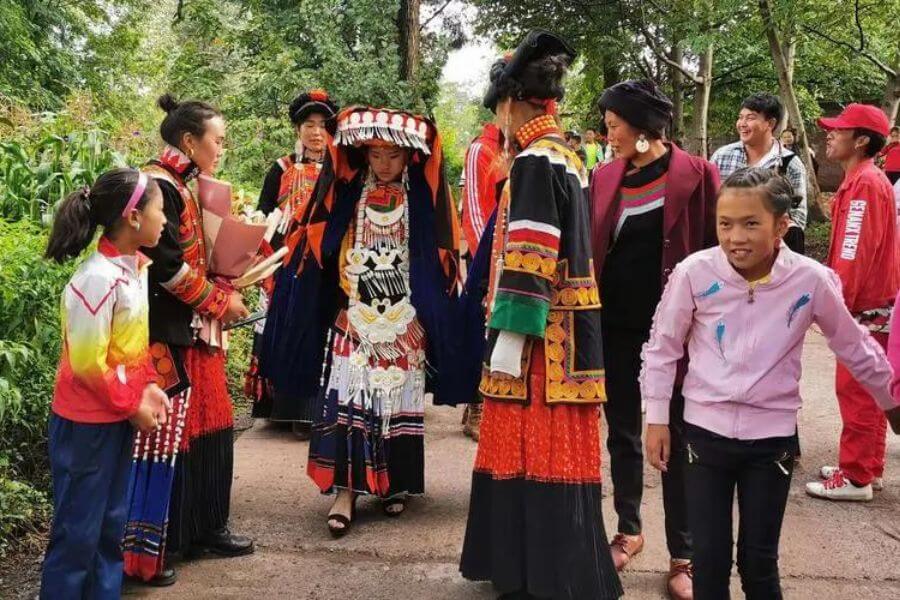
Marriage Customs
Marriages in the Yi community are often detailed affairs involving complex negotiations and rituals. A bride price and dowry are usually exchanged, and marriages are generally arranged by families to build stronger clan ties. Wedding ceremonies are lively events filled with traditional music, dance, and colorful costumes, emphasizing the importance of the union to the community.
What makes Yi people recognizable is their colorful cultural traditional clothes. Their clothes are so colorful and rich with embroidery that makes you feel more happy and more cheerful.
Traditional Dress
The traditional clothing of the Yi tells stories about who they are and their place in society. Different Yi groups might wear different styles, but common elements include bright colors that carry special meanings. For instance, black, often worn by the higher-status Black Yi, represents dignity and importance, while colors like red and yellow symbolize happiness and wealth.
Yi men usually wear long tunics and wide pants, often with a turban or a felt hat, while Yi women wear long skirts and embroidered tops. Jewelry, especially silver pieces, is also important in Yi dress, believed to protect against evil spirits.
Embroidery: Styles and Techniques
Embroidery is a key part of Yi culture, showing off the artistic skills of Yi women, who learn this craft from a young age. The embroidery involves various stitches and designs, including animals, flowers, and patterns, each chosen for their meanings, like good luck, beauty, or long life.
This embroidery isn't just for show; it's deeply tied to Yi customs and is used during special occasions like weddings and festivals. Certain designs are meant only for these important times, reflecting the event's importance.
For visitors, seeing the traditional Yi dress and embroidery offers a vivid glimpse into the rich cultural life of the Yi, showcasing their creativity and deep-rooted traditions.
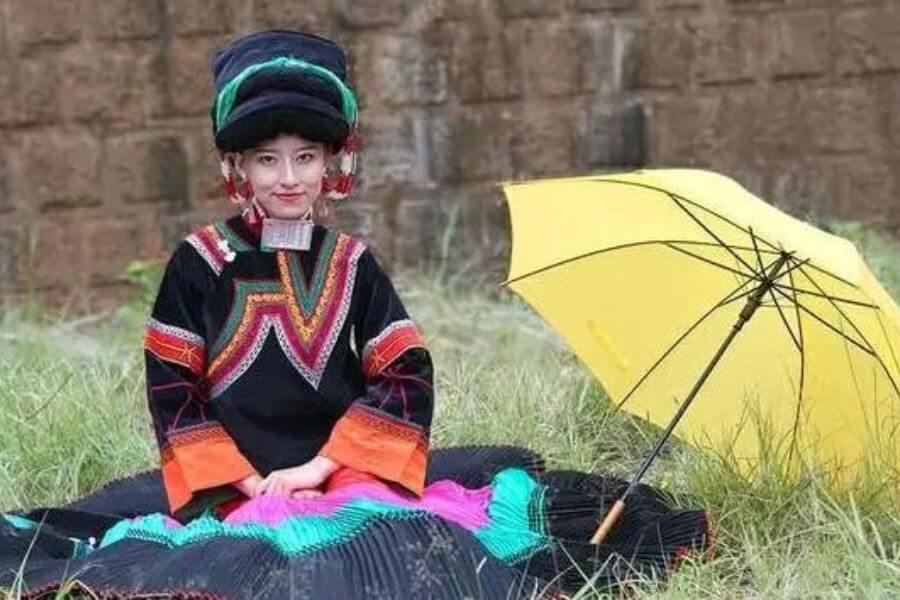
Music and Dance of Yi People
The Yi people express their rich culture vividly through their traditional music and dance, which are central to their social rituals and festive celebrations. These artistic forms not only entertain but also help keep Yi traditions and stories alive.
Traditional Yi Music and Instruments
Yi music features unique instruments that create special sounds, reflecting the natural surroundings of their mountain homes. The moon guitar (Yueqin), a stringed instrument, is loved for its sweet sound and is often played in Yi songs. Another important instrument is the lusheng, a bamboo mouth organ that produces deep, echoing tones, typical of Yi music.
Drums and flutes also play key roles, providing rhythmic beats and melodies for various occasions.
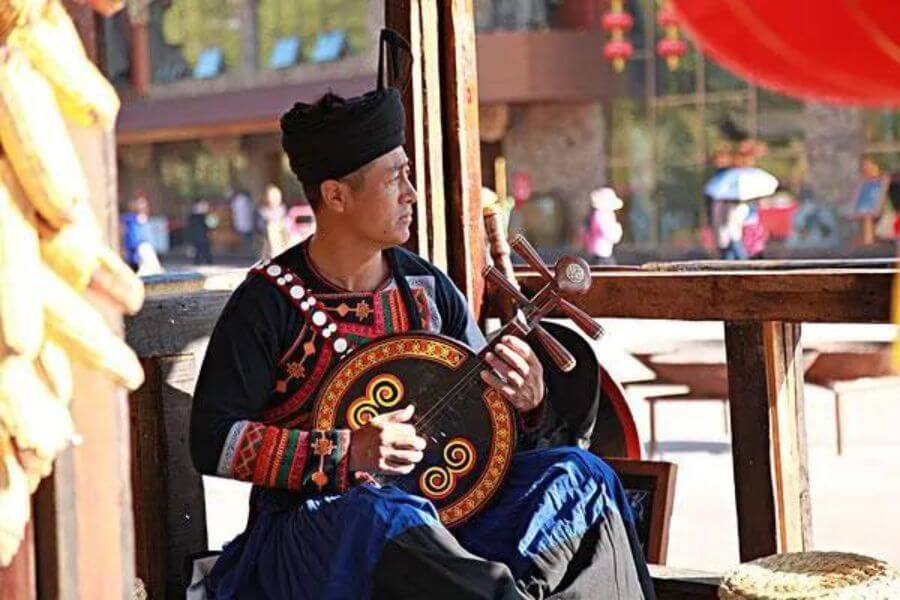
Festivals and Celebrations
Music and dance are essential in Yi rituals and festivals, where they are not just for fun but also hold spiritual and storytelling importance. For example, during the Torch Festival, music and dance help drive away bad spirits and ask for a successful harvest. Every step and note in these performances is filled with meaning and cultural significance.
These traditions also strengthen community ties and uphold social values, weaving the rich cultural fabric of the Yi into every part of their lives. Watching these music and dance performances is an enchanting way for visitors to understand the Yi people's traditions, beliefs, and artistic expression.
Yi Torch Festival
One of the most famous Yi festivals, the Torch Festival, also known as Xinghui Festival, is celebrated on the 24th day of the sixth lunar month. Characterized for this festival are the lighting of torches to ward off evil spirits and ensure prosperity. The festival includes bullfighting, horse racing, and traditional singing and dancing, making it a vibrant and dynamic celebration.
Other festivfals in Yi traditions
Yi New Year
The Yi New Year, also known as the Kuzhazha Festival, is celebrated over several days and is akin to the Lunar New Year.
Yi Dragon Festival
Celebrated on the eighth day of the second lunar month, the Yi Dragon Festival is similar to the Han Chinese Dragon Boat Festival but with distinct Yi characteristics. It includes dragon boat races, as well as various agricultural rituals intended to pray for good weather and bountiful harvests.
Yi Flower Mountain Festival
Another significant event is the Flower Mountain Festival, which takes place around the fifth lunar month. It serves as both a religious observance and a community social gathering.
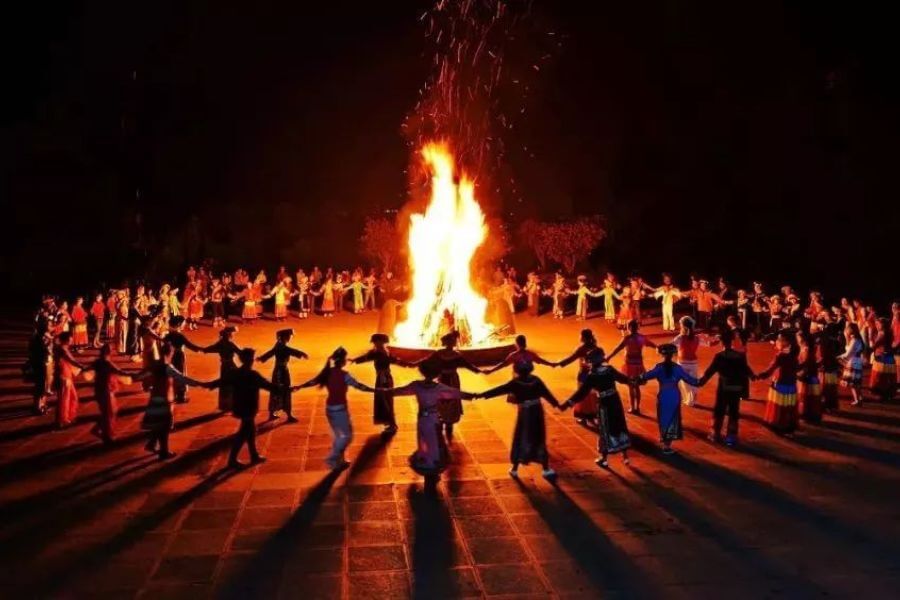
Yi People Nowadays
Yi people live in different regions of China, primarily in the southwestern provinces in China. However, you can visit some of the places where you can see and feel the tradition and beauty of their living
Here’s a closer look at where you can find them today:
Sichuan Province
A significant number of Yi live in the Liangshan Yi Autonomous Prefecture, one of the largest and most well-known Yi communities. This area offers a deep dive into Yi culture, with opportunities to experience their festivals, traditional villages, and unique way of life. You can visit Sichuan attractions, and villages and also meet local people with some of our Sichuan tours.
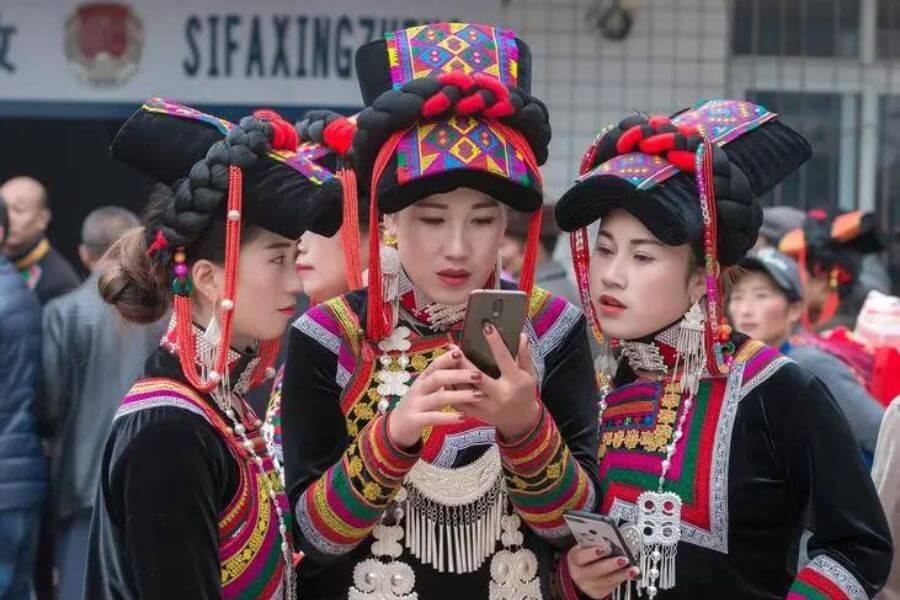
Yunnan Province
Yunnan is another key region where the Yi people are found, particularly in the Chuxiong Yi Autonomous Prefecture and other parts of the province. Yunnan’s diverse ethnic tapestry includes a substantial Yi population, each group maintaining its distinct dialects and traditions. Yunnan offers a great pallet of attractions worth visiting in China, so we have awesome Yunnan tours for you to choose from.
Guizhou Province
In Guizhou, the Yi are part of the broader ethnic mosaic, contributing to the region’s cultural diversity. They live mainly in the southeastern parts, where their customs and traditional lifestyle are integral to the local heritage. This minority tour allows travelers to get close to the southern minorities in China.
Guangxi Zhuang Autonomous Region
Though fewer in number here compared to the provinces mentioned above, some Yi communities also exist in Guangxi, adding to the region's ethnic diversity.

Traveling to China to meet locals and experience their traditions and culture is the best adventure that someone can ask for. Yi or Nuosu people are an ethnic group in China that has so much history, and their colorful traditional clothes will give you the feeling that you are back in time in Ancient China. If you are that type of adventurer, then choose some of our minority tours and get in deep into Chinese ethnic groups and their customs and visit the most beautiful natural landscapes where they live.


